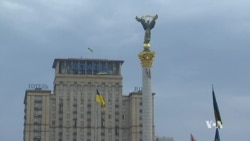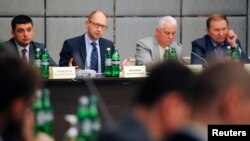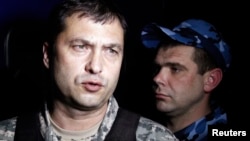Lawmakers and officials from eastern Ukraine on Saturday strongly criticized the fledging central government, accusing it of ignoring legitimate grievances in areas of the regions controlled by pro-Russian militias fighting for independence.
Last weekend's unofficial referendum in favor of independence for the Donetsk and Luhansk regions "expressed the will of the people," said Valery Holenko, chairman of Luhansk’s regional government, according to the Associated Press.
Holenko acknowledged the referendum had no legal standing, but said it had significance as “a protest vote.”
The second round of peace talks, in the eastern city of Kharkiv, came hours after Ukraine's election board warned that instability threatens next week's crucial presidential elections and after violence erupted again. A rebel leader seized at a checkpoint near Kharkiv was freed by armed supporters, and gunfire broke out near the separatist stronghold of Slovyansk.
No insurgents were invited to the “national unity” talks, brokered by the Organization for Security and Cooperation in Europe to defuse Ukraine’s worst crisis since the Soviet Union’s 1991 collapse. The insurgents, described by Kyiv as terrorists, say they are willing to discuss only the withdrawal of Ukrainian troops and recognition of the regions' independence.
Acting Prime Minister Arseniy Yatsenyuk urged the assembled eastern leaders to resist armed separatists and support the central government's efforts to devolve powers to the regions.
Story continues below photo gallery:
"You have got in your home, in Luhansk and Donetsk, armed terrorists who are funded by Russians and those who fled Ukraine and want to seize our land," Yatsenyuk said, according to the AP. "We're not going talk to robbers and terrorists. They will not be telling the Ukrainian people how to live in our country."
He urged the eastern leaders to disarm the insurgents, "regain the power and start a political dialogue."
Holenko, Luhansk’s leader, called upon the central government to stop its “anti-terrorist operation” in the east, the AP reported.
On Saturday, the Central Election Commission called for Kyiv authorities to take urgent action to ensure security in the east, saying the rebellion could prevent almost 2 million people from voting May 25. It said it couldn’t prepare for the vote in the east because of threats and "illegal actions" by separatists who have taken control of more than a dozen towns and cities since early April.
Rebel leader seized, freed
Also on Saturday, Valery Bolotov, the self-proclaimed governor of Ukraine's eastern Luhansk region, was detained at a checkpoint after returning from Russia, where he’d been treated for wounds from an attack Tuesday, border guards spokesman Oleh Slobodyan said. About 200 armed separatists went to the checkpoint to demand his release, freeing him in a firefight with machine guns and grenades.
“We are trying to find out whether there are victims,” Slobodyan said.
In Andriyivka, a village four kilometers (2.4 miles) from Slovyansk, Ukrainian troops exchanged gunfire with pro-Russian forces determined to protect the village, resident Yuri Shevchenko said.
"We will not be pushed out of here,” Shevchenko said. “This is our land, this is our motherland. Our children and grandchildren are living and will continue to live here. Why do they come here, why are they shooting at peaceful people? People can no longer live in Andriyivka."
Slovyansk and the surrounding area has seen some of the worst fighting in recent months as pro-Russian militia continued calling for the Donetsk region’s independence from Ukraine’s central government in Kyiv.
Despite a month-long offensive, the Ukrainian military has failed to wrest back control of the main industrial regions of Donetsk and Luhansk, where rebels have now declared their own independent republics in defiance of Kyiv and the West.
A challenging election
The West sees the election as crucial to defusing the crisis on Europe's eastern flank and preventing the former Soviet republic from disintegrating further after Russia's annexation of Crimea.
But Russia questioned how an election taking place amid fighting could possibly meet democratic norms.
"Can elections held amid the thunder of guns really meet the democratic norms of the electoral process?" Russia's foreign ministry said in a statement, urging Kyiv to immediately halt "punitive action against its own citizens."
It also said the government was using the unity talks "as a cover for aggressive action" and urged Western nations to tell Kyiv to "launch real and not phony work toward national reconciliation."
Pressure from the West
But the United States and its allies applied further pressure on Moscow Friday to allow the election to go ahead.
In a phone call, President Barack Obama and French counterpart Francois Hollande "underscored that Russia will face significant additional costs if it continues its provocative and destabilizing behavior," the White House said in a statement.
Obama has already drafted an executive order for sanctions across key sectors in Russia such as banking, energy, defense and mining, adding to punitive measures already imposed by Washington and Brussels.
In total, 36 million Ukrainians are eligible to vote May 25 in an election expected to deliver victory to billionaire chocolate baron Petro Poroshenko.
The vote was called by the new leaders installed in Kyiv after months of sometimes deadly pro-EU protests that led to the February ouster of Kremlin-backed president Viktor Yanukovych, viewed by many as corrupt and authoritarian.
Some information for this report provided by Reuters, AP and AFP.
Last weekend's unofficial referendum in favor of independence for the Donetsk and Luhansk regions "expressed the will of the people," said Valery Holenko, chairman of Luhansk’s regional government, according to the Associated Press.
Holenko acknowledged the referendum had no legal standing, but said it had significance as “a protest vote.”
The second round of peace talks, in the eastern city of Kharkiv, came hours after Ukraine's election board warned that instability threatens next week's crucial presidential elections and after violence erupted again. A rebel leader seized at a checkpoint near Kharkiv was freed by armed supporters, and gunfire broke out near the separatist stronghold of Slovyansk.
No insurgents were invited to the “national unity” talks, brokered by the Organization for Security and Cooperation in Europe to defuse Ukraine’s worst crisis since the Soviet Union’s 1991 collapse. The insurgents, described by Kyiv as terrorists, say they are willing to discuss only the withdrawal of Ukrainian troops and recognition of the regions' independence.
Acting Prime Minister Arseniy Yatsenyuk urged the assembled eastern leaders to resist armed separatists and support the central government's efforts to devolve powers to the regions.
Story continues below photo gallery:
"You have got in your home, in Luhansk and Donetsk, armed terrorists who are funded by Russians and those who fled Ukraine and want to seize our land," Yatsenyuk said, according to the AP. "We're not going talk to robbers and terrorists. They will not be telling the Ukrainian people how to live in our country."
He urged the eastern leaders to disarm the insurgents, "regain the power and start a political dialogue."
Holenko, Luhansk’s leader, called upon the central government to stop its “anti-terrorist operation” in the east, the AP reported.
On Saturday, the Central Election Commission called for Kyiv authorities to take urgent action to ensure security in the east, saying the rebellion could prevent almost 2 million people from voting May 25. It said it couldn’t prepare for the vote in the east because of threats and "illegal actions" by separatists who have taken control of more than a dozen towns and cities since early April.
Rebel leader seized, freed
Also on Saturday, Valery Bolotov, the self-proclaimed governor of Ukraine's eastern Luhansk region, was detained at a checkpoint after returning from Russia, where he’d been treated for wounds from an attack Tuesday, border guards spokesman Oleh Slobodyan said. About 200 armed separatists went to the checkpoint to demand his release, freeing him in a firefight with machine guns and grenades.
“We are trying to find out whether there are victims,” Slobodyan said.
In Andriyivka, a village four kilometers (2.4 miles) from Slovyansk, Ukrainian troops exchanged gunfire with pro-Russian forces determined to protect the village, resident Yuri Shevchenko said.
"We will not be pushed out of here,” Shevchenko said. “This is our land, this is our motherland. Our children and grandchildren are living and will continue to live here. Why do they come here, why are they shooting at peaceful people? People can no longer live in Andriyivka."
Slovyansk and the surrounding area has seen some of the worst fighting in recent months as pro-Russian militia continued calling for the Donetsk region’s independence from Ukraine’s central government in Kyiv.
Despite a month-long offensive, the Ukrainian military has failed to wrest back control of the main industrial regions of Donetsk and Luhansk, where rebels have now declared their own independent republics in defiance of Kyiv and the West.
A challenging election
The West sees the election as crucial to defusing the crisis on Europe's eastern flank and preventing the former Soviet republic from disintegrating further after Russia's annexation of Crimea.
But Russia questioned how an election taking place amid fighting could possibly meet democratic norms.
"Can elections held amid the thunder of guns really meet the democratic norms of the electoral process?" Russia's foreign ministry said in a statement, urging Kyiv to immediately halt "punitive action against its own citizens."
It also said the government was using the unity talks "as a cover for aggressive action" and urged Western nations to tell Kyiv to "launch real and not phony work toward national reconciliation."
Pressure from the West
But the United States and its allies applied further pressure on Moscow Friday to allow the election to go ahead.
In a phone call, President Barack Obama and French counterpart Francois Hollande "underscored that Russia will face significant additional costs if it continues its provocative and destabilizing behavior," the White House said in a statement.
Obama has already drafted an executive order for sanctions across key sectors in Russia such as banking, energy, defense and mining, adding to punitive measures already imposed by Washington and Brussels.
In total, 36 million Ukrainians are eligible to vote May 25 in an election expected to deliver victory to billionaire chocolate baron Petro Poroshenko.
The vote was called by the new leaders installed in Kyiv after months of sometimes deadly pro-EU protests that led to the February ouster of Kremlin-backed president Viktor Yanukovych, viewed by many as corrupt and authoritarian.
Some information for this report provided by Reuters, AP and AFP.









